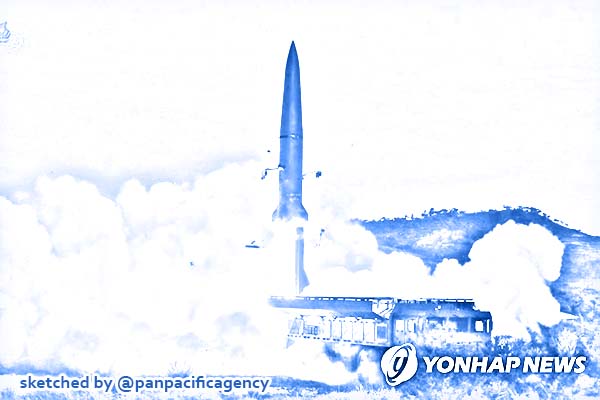N. Korea fires 2 short-range ballistic missiles off east coast

This footage, aired by the (North) Korean Central Television on July 26, 2019, shows a short-range missile being fired from a transporter erector launcher on the Hodo Peninsula near the eastern coastal town of Wonsan the previous day. (For Use Only in the Republic of Korea. No Redistribution) (Yonhap). Sketched by the Pan Pacific Agency.
SEOUL/WASHINGTON D.C., Jul 31, 2019, Yonhap. North Korea fired two short-range ballistic missiles off its east coast Wednesday, South Korea’s military said, the second such launch in less than a week, reported the Yonhap.
The first missile was launched at 5:06 a.m., and the second at 5:27 a.m., from the Kalma area in the North’s eastern port of Wonsan, according to the Joint Chiefs of Staff (JCS).
Both are estimated to have flown about 250 kilometers at an approximate altitude of 30 km, the JCS said, adding that the South Korean and U.S. militaries are analyzing more details.
The launches come six days after North Korea fired two short-range ballistic missiles from the same area into the East Sea in its first provocation since May. Those missiles flew some 600 kilometers at an altitude of around 50 km and were identified as “KN-23,” or the North’s version of Russia’s Iskander ballistic missile.
“Successive missile launches by North Korea are not conducive to efforts to reduce tensions on the Korean Peninsula, and we call for a halt to these acts,” the JCS said in a statement.
A JCS official told reporters that Wednesday’s missiles were fired from a transporter erector launcher (TEL), as was the case with the launches last week, adding that the launches appear to be a test of the weapons, given their relatively low altitude.
He added that the missiles appear to be similar to those launched last week, though the military is analyzing data related to the pattern of their flight.
After last week’s missile firings, North Korea’s state media said that the launches, held under the supervision of leader Kim Jong-un, were designed to send a “solemn” warning to South Korea over its plan to conduct joint military drills with the U.S. next month and purchase high-tech fighter jets from the ally.
South Korea held a National Security Council (NSC) meeting and expressed “strong” concerns over the launches, urging Pyongyang to stop acts that could heighten tensions and hamper efforts to bring peace to the Korean Peninsula.
Foreign Minister Kang Kyung-wha also said that North Korea’s latest missile firings are not helpful in easing military tensions or in keeping the momentum for denuclearization talks.
Defense Minister Jeong Kyeong-doo earlier said that North Korea should be regarded as an “enemy” if it carries out provocations that threaten South Korea.
“North Korea’s regime and military are of course included in the concept of an enemy if they threaten and provoke us,” he told a forum held earlier in the day in Seoul. It was the strongest expression he has used to describe the North since taking office last year.
The United States responded cautiously.
“We are aware of reports of a missile launch from North Korea, and we will continue to monitor the situation,” a State Department spokesperson told Yonhap News Agency on condition of anonymity.
The series of launches comes as Washington has sought to restart working-level talks on dismantling the North’s nuclear and ballistic missile programs in line with an agreement reached when U.S. President Donald Trump and North Korean leader Kim Jong-un held a surprise meeting at the inter-Korean border last month.
Despite last week’s missile launches, the U.S. has remained upbeat about the prospects for talks with the North, with Trump dismissing last week’s missiles as “smaller ones” that many countries test. U.S. Secretary of State Mike Pompeo also said Monday he hoped the discussions will resume “very soon.”
Pompeo also described last week’s launches as a negotiating tactic that allowed the talks to move forward. While noting the U.S. commitment to diplomacy, the State Department urged North Korea to refrain from further “provocations.”
Trump insisted earlier Tuesday that he has a good relationship with Kim.
“My relationship with Kim Jong-un is a very good one, as I’m sure you’ve seen,” he told reporters at the White House. “We’ll see what happens. I can’t tell you what’s going to happen.”
The North has also renewed its commitment to talks.
According to U.S. news reports, North Korean and U.S. officials held a secret meeting at the truce village of Panmunjom last week, where the North Koreans expressed a willingness to resume working-level nuclear talks very soon.
U.N. Security Council resolutions ban North Korea from launching ballistic missiles. On Monday, the U.S. Treasury Department sanctioned a Vietnam-based North Korean individual for his alleged involvement in the weapons program.
Experts said the missile launches appear to be aimed at increasing pressure on the United States ahead of the possible resumption of nuclear talks with Washington.
“What’s important for the North is to draw Washington’s attention and make them come up with better terms closer to their demands, and it’s their underlying message that the negotiations can break down if the U.S. doesn’t act,” Shin Beom-chul, a senior fellow at the Asan Institute for Policy Studies, said.
By Koh Byung-joon and Lee Haye-ah